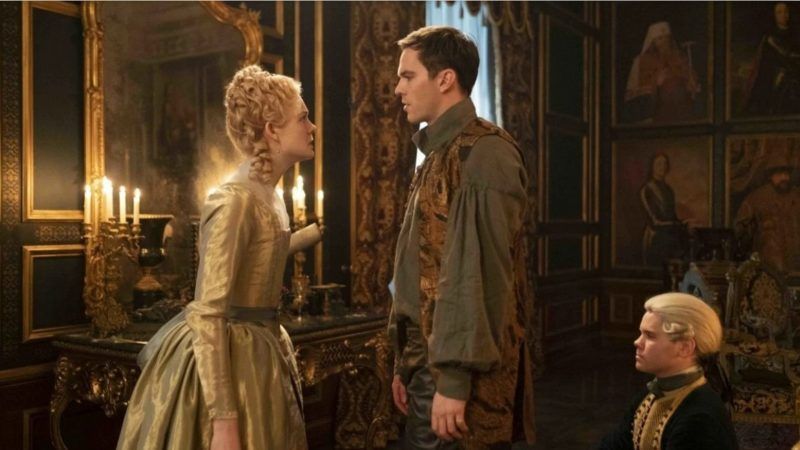Hulu's Bonkers 'Retelling' of the Life of Catherine the Great a Wild, Fun Ride
Just don’t expect too much historical accuracy.

The Great. Available now on Hulu.
Was Donald Trump planning to hand the United States over to Vladimir Putin? Catherine the Great seems like a better bet to me. I mean, something weird and possible sinister must be going on when two premium TV networks schedule expensive miniseries about an 18th-century Russian monarch in a seven-month span. What does Stalin have to do to get a break? Do 10 million dead kulaks mean nothing these days?
Not that there's any chance of getting the two Catherines mixed up. HBO's Catherine the Great, which aired last year and starred Helen Mirren as the empress and Jason Clarke as one of her many lovers, was historically accurate but dumb as a rock. Hulu's The Great, which has Elle Fanning (Maleficent) as Catherine and Nicholas Hoult (the X-Men movies) as her husband Emperor Peter III, is historically bonkers—in the opening credits, the title appears with an asterisk: "*an occasionally true story"—but so witty it will make your brain melt.
Hulu's 10-part miniseries is adapted from Australian screenwriter Tony McNamara's own 2008 play of the same name, a blackly comic retelling of the life young Prussian woman who transformed a politically arranged marriage into a 32-year reign full of wars and palace intrigue that expanded Russian territory some 200,000 miles. McNamara concentrates on the backstabbery inside the palace, which was bad enough in real life—Catherine took power in a coup launched with a lover against her own husband, just for starters—but assumes epic proportions in The Great.
In McNamara's fanciful if funny view, the young princess was a sweetly romantic avatar of European sophistication and Western liberalism who in Russia found herself surrounded by louts and crudity, exemplified by her drunken, bellicose husband. Peter likes to eat among the severed heads of his enemies, communes regularly with the desiccated remains of his mother, and consummates his marriage to Catherine while chatting with his palace posse about duck calls. His proposal to her is practically Shakespearean: "I need an empress who is from aristocracy, but not from a family that is powerful or a player. Your family, apparently, are fucked." His attempts at politesse are scarcely more ept than his wham-bam-thank-you-ma'am romantic skills. Begins an apology to a stricken Catherine: "You probably don't remember this, but a week or two ago, I shot your bear and punched you… ."
If anything, The Great resembles a sort of Slavic Caligula. Every hallway of the comically uncivilized palace is filled with brawling fools, every corner with humping idiots. Crosstalk chatter at the court dinner table: "Have you tried eating pussy?" The women are mostly badly programmed Stepford Wives, none of whom can read ("It sounds boring," protests one; "and time consuming," adds another) and spend much of their time trying on imported French wigs, which they think are hats.
Catherine tries gamely to adjust—"He is a mercurial fellow, deep of heart, I feel," she says brightly after her husband roughly gropes her in a castle hall in front of a dozen people—and does her best to civilize him. He responds well to the concept of foreplay; to the works of Rousseau, not so much. In possibly the funniest scene in the first four episodes (all that I watched), she reads to Peter an aphorism from the works of the French philosopher Diderot—"Man will never be free until the last king has been strangled with the entrails of the last priest"—and gets only a blank smile in return. As Peter's brutal conspiracies continue, Catherine launches one of her own.
The cast of The Great is outstanding. At the top of the list is Fanning, who started her career playing younger versions of her sister Dakota in films with flashback sequences, and has grown into arguably the superior actress of the two. Her performance in The Great is a marvel of character evolution and concealment, starting out as a jolly teenager given to poetic outbursts who soon sours to unconcealed rage. She's nearly equaled by the wildly underappreciated Hoult (Mad Max: Fury Road), who plays Peter as an overgrown kid with an ADD diagnosis in one hand and a hyperactive broadsword in the other.
Fanning and Hoult get outstanding support from Sacha Dhawan (the latest Dr. Who series) as Orlov, an astute but wimpy member of Catherine's coup-plotting team. Likewise from British stage actress Phoebe Fox as her cynical and bloodthirsty lady in waiting Marial, whose regular deadpan rejoinder to Catherine's idealistic gushing about sex, romance, and the civic necessity of political murder ("Riggggghht") is The Great's best running gag. Less for laughs is the show's treatment of the rumors about Catherine's supposed overly affectionate disposition toward horses. Suffice it to say that the cruelty of Facebook and Twitter would come as no big surprise to Catherine.

Show Comments (15)